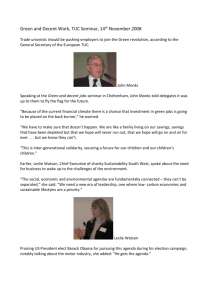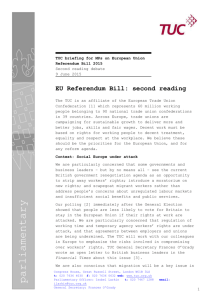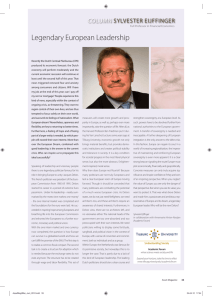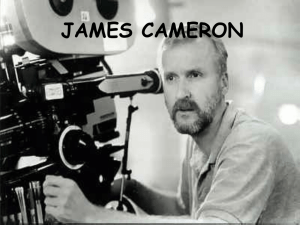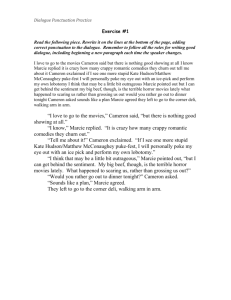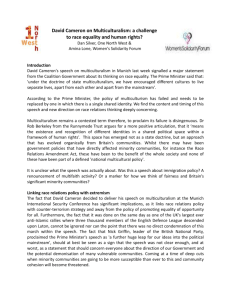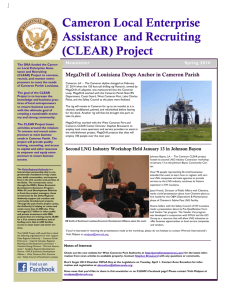chartergroupspeech231015
advertisement
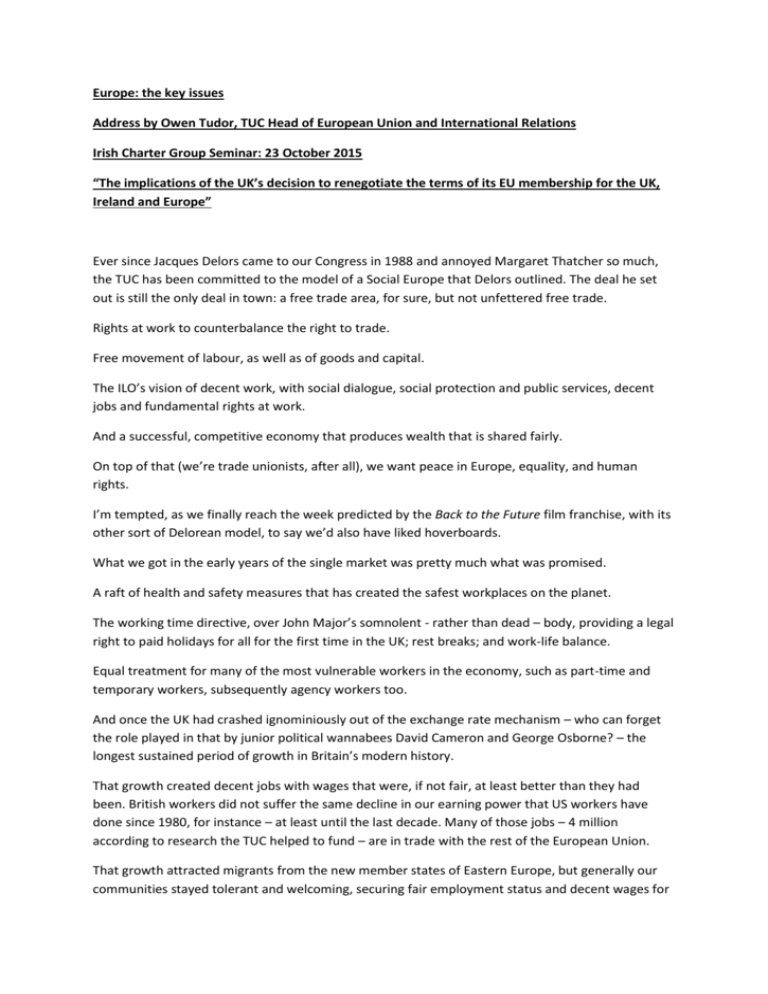
Europe: the key issues Address by Owen Tudor, TUC Head of European Union and International Relations Irish Charter Group Seminar: 23 October 2015 “The implications of the UK’s decision to renegotiate the terms of its EU membership for the UK, Ireland and Europe” Ever since Jacques Delors came to our Congress in 1988 and annoyed Margaret Thatcher so much, the TUC has been committed to the model of a Social Europe that Delors outlined. The deal he set out is still the only deal in town: a free trade area, for sure, but not unfettered free trade. Rights at work to counterbalance the right to trade. Free movement of labour, as well as of goods and capital. The ILO’s vision of decent work, with social dialogue, social protection and public services, decent jobs and fundamental rights at work. And a successful, competitive economy that produces wealth that is shared fairly. On top of that (we’re trade unionists, after all), we want peace in Europe, equality, and human rights. I’m tempted, as we finally reach the week predicted by the Back to the Future film franchise, with its other sort of Delorean model, to say we’d also have liked hoverboards. What we got in the early years of the single market was pretty much what was promised. A raft of health and safety measures that has created the safest workplaces on the planet. The working time directive, over John Major’s somnolent - rather than dead – body, providing a legal right to paid holidays for all for the first time in the UK; rest breaks; and work-life balance. Equal treatment for many of the most vulnerable workers in the economy, such as part-time and temporary workers, subsequently agency workers too. And once the UK had crashed ignominiously out of the exchange rate mechanism – who can forget the role played in that by junior political wannabees David Cameron and George Osborne? – the longest sustained period of growth in Britain’s modern history. That growth created decent jobs with wages that were, if not fair, at least better than they had been. British workers did not suffer the same decline in our earning power that US workers have done since 1980, for instance – at least until the last decade. Many of those jobs – 4 million according to research the TUC helped to fund – are in trade with the rest of the European Union. That growth attracted migrants from the new member states of Eastern Europe, but generally our communities stayed tolerant and welcoming, securing fair employment status and decent wages for them – we had our minimum wage by then, which I think was more crucial to good community relations than many people realise – and allowing them to contribute in demand and taxation to sustaining that boom. We should never be complacent - and we wanted much more to be done on exploitation, undercutting and provision of housing and public services – but we held back any rising tide of racism and fascism, as other European countries have not. And then there was the crash. Since 2008, we have seen austerity adopted by governments across Europe as well as the European Commission and the Central Bank; a virtual freeze on new rights for working people and attacks on collective bargaining; harsh regimes imposed on countries like Ireland and especially Greece; and the turn to so-called trade agreements like CETA, TTIP and TiSA that are in reality merely attempts to hand power and wealth to corporations through mechanisms like investor-state dispute settlement. None of these are because of the EU – indeed the UK government imposed austerity purely out of choice. If this process had brought wealth to us all, or at least the social cohesion of being ‘all in it together’ as our Chancellor once put it, that might have been acceptable. But in sum, the conditions are not good for urging our members to vote enthusiastically for remaining in the European Union. No matter how low mobile phone roaming charges go. On top of all that, David Cameron’s desperate attempt to fend off UKIP and pacify his backbench Europhobes has delivered us a pig in a poke referendum (I’ll say no more about pigs) based on a secret renegotiation agenda. We were concerned before the General Election in May that Cameron’s agenda for Europe would be more anti-social than Delors’. What we’ve heard since – despite being told regularly that there is no agenda on workers’ rights – is not comforting. Given what he has been doing to our rights in the Trade Union Bill, it would be remarkable if he let this opportunity slip by. Employers and right-wingers have been lobbying persistently for changes to the Working Time Directive – in particular rolling back many of the European Court of Justice judgments, and making the opt-out permanent – and the Temporary Agency Workers Directive. The Minister for Europe admitted as much when he wrote to us at the end of the summer. Above all, they argue that any future workers’ rights should be decided nationally rather than at European level, so that while the labour market continues to develop - with zero hours contracts the latest massive loophole to be created – the measures that protect workers from exploitation and abuse should remain frozen, increasingly inadequate. Our understanding is that No 10 planned to introduce its workers’ rights agenda late in the negotiation process – a rabbit from the hat – so that David Cameron could bang the table one last time to demonstrate his gamesmanship and ability to stand up for Britain (or at least, Britain’s bosses), when it was too late for the trade union movement to organise resistance and we had already gone too far down the road of backing the stay in campaign to be able to deflect him. That’s one reason why we have been ‘banging on’ about the threat to workers’ rights, so hard and so loud and so early. But there is another reason. TUC polling after the election – and we understand this is confirmed by polling from both the in and out camps – showed us that, if the renegotiation agenda put emphasis on attacking workers’ rights, then working people were going to be less likely to vote to stay in. As Delors understood, free markets have losers as well as winners, and a lot of our people rightly feel that they have lost out not just to globalisation, but to the economic rules of the single market too. They may not express it in quite that way, but they feel insecure, worried about their jobs and livelihoods, concerned about the future their kids will grow up in. The workers’ rights provided by the European Union are often the last and only line of defence against the harsh winds of competition, liberalisation and deregulation. So we have had no hesitation in telling the Prime Minister that he will lose our members’ votes to stay in the EU if he tries to worsen workers’ rights. It’s worth dwelling for a moment on the British employer agenda over the EU referendum. There are obviously differences in the employer case, but fundamentally there is a recognition for them that the key issue is access to markets – for labour as well as customers – and that that defines their interest in the referendum. But they also have an eye out for anything else they can knock off in the process, and they have at the very least shown a willingness to take whatever they can get from the Conservative attack on workers’ rights. They have shown very little willingness to echo the trade union approach of recognising that the other side of the free market coin is a high level of workplace rights. So that warning to the Prime Minister applies also to employers. Be careful what you wish for. Aside from issuing warnings to those in my own country, I am also here today to ask for your help. International solidarity can apply across Europe, as well as further afield. As well as what Irish trade unions are doing to help us tackle the Trade Union Bill, we particularly need your help on the referendum renegotiation. The European Trade Union Confederation adopted an emergency resolution on the subject at its Congress last month, and thanks to the trade unionists here who helped make that happen. We are calling on trade unionists and politicians around the EU to persuade their governments not to agree to any dilution or undermining of workers’ rights David Cameron proposes. If employers agree, do weigh in too. Like so many other examples of solidarity, this is worth doing not just for us, but for yourselves. If David Cameron gets his way, British workers will be undercutting workers in Ireland, and how long will it be before your government starts asking why they can't get away with lower workers' rights too? Cameron's reform agenda is a virus that would seriously harm British workers, but it could also spread and take the European social model down too. Thanks for listening.
